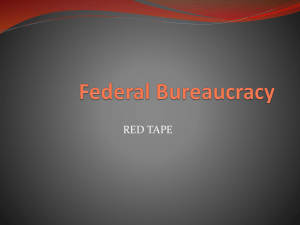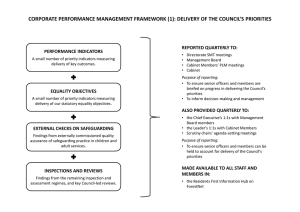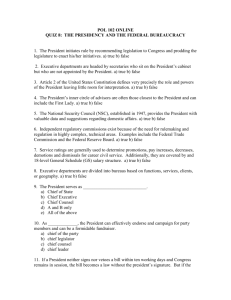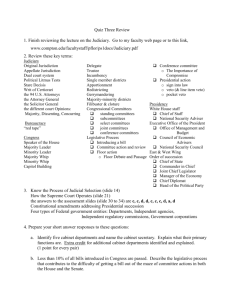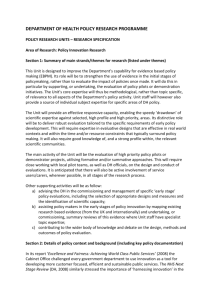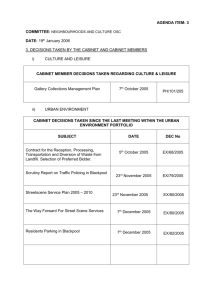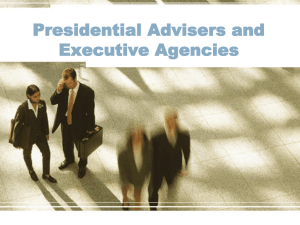part 1 summary and explanation
advertisement
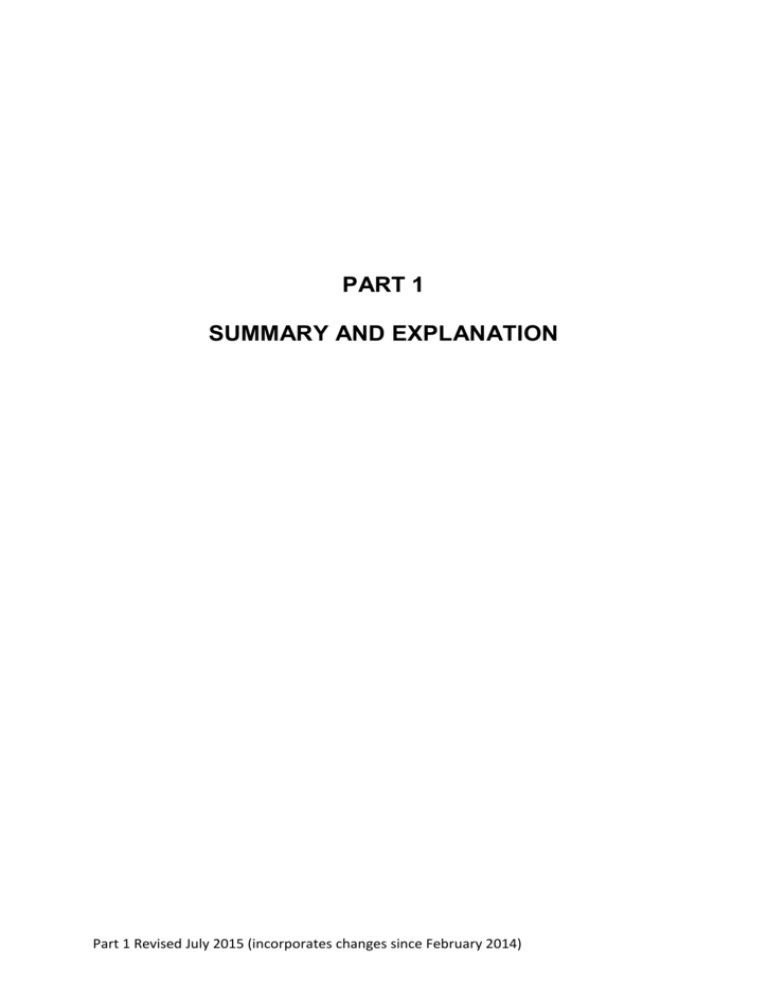
PART 1 SUMMARY AND EXPLANATION Part 1 Revised July 2015 (incorporates changes since February 2014) Summary and Explanation 1. The Council’s Constitution Kirklees Council has a Constitution which sets out how the Council operates and the procedures which are followed to ensure that these are efficient, transparent and accountable to local people. Some of these processes are required by law, while others are a matter for the Council to choose. The Constitution is divided into 16 Articles which set out the basic rules governing the Council’s business. More detailed procedures, responsibilities and Codes of Practice are provided in separate sections, which follow the Articles. 2. What’s in the Constitution? Article 1 of the Constitution commits the Council, working as a community leader in partnership with others, to providing high quality services that address inequalities and give opportunity for all, with governance arrangements that deliver efficient, open and accountable decision making. Articles 2 – 17 explain the rights of citizens and how the key parts of the Council operate. These are: • • • • • • • • • • • • • • • • Members of the Council (Article 2) Citizens and the Council (Article 3) The Full Council (Article 4) Role of the Mayor (Article 5) The Overview and Scrutiny Function (Article 6) The Executive (Cabinet) (Article 7) Regulatory and Other Committees (Article 8) The Standards Committee (Article 9) Area Committees (Article 10) Joint Arrangements and Joint Committees (Article 11) Officers (Article 12) Decision Making (Article 13) Finance, Contracts and Legal Matters (Article 14) Review and Revision of the Constitution (Article 15) Suspension, Interpretation and Publication of the Constitution (Article 16) Health (Article 17) The Schedule sets out which parts of the Constitution form the “executive arrangements” which are required by law. 3. How the Council Operates The Council is composed of 69 Councillors with one third elected three years in four. Councillors are democratically accountable to residents of their ward. The overriding duty of Councillors is to the whole community, but they have a special duty to their constituents, including those who did not vote for them. Part 1 Revised July 2015 (incorporates changes since February 2014) Councillors have to agree a Code of Conduct to ensure high standards in the way they undertake their duties. The Council’s Standards Committee advises them on and monitors and reviews the Code of Conduct, recommends the adoption of protocols supplementary to the Code of Conduct, arranges training and establishes Sub-Committees to consider reports into alleged breaches of the Member Code of Conduct referred to it by the Monitoring Officer. All Councillors meet together as the Council. Meetings of the Council are normally open to the public. Here Councillors decide the Council’s overall policies and set the Budget each year. The Council appoints the Leader and Members of the Cabinet and it also appoints the various committees of the Council. At Council meetings, Members of the Council may: • • • • • Put forward motions for debate on issues of concern; Question the Members of the Cabinet on their functions and the Council’s services; Ask questions of the Chairs of other Council Committees and Council representatives on joint authorities such as the West Yorkshire Police Authority; Present petitions to the Council on behalf of local people; Debate and decide the Budget and major Council policies. Members of the public are also entitled to ask questions at Council meetings; and to attend and speak as a deputation. Members of the public may also take part in debates which are specifically identified for that purpose. 4. How Decisions are Made Some Council functions, such as decisions on planning applications or licensing matters, are the responsibility of the Council itself. The Council has set up committees to deal with most of these. The Executive, which is known as the Cabinet, is the part of the Council which is responsible for most day to day decisions. It is made up of the Leader and between 2 and 9 other Council Members appointed by the Council. When major decisions are to be discussed or made, 28 days notice must generally be given and also published in the Forward Plan on the Council’s website. If these major decisions are to be discussed with Council officers at a meeting of the Cabinet, this will generally be open for the public to attend, except where personal or confidential matters are being discussed. In practice all decision-making by the Cabinet is similarly open to the public. The Cabinet has to make decisions which are in line with the Council’s overall policies and Budget which have to be decided by the Council as a whole. If the Cabinet wishes to make a decision which is outside the Budget or policy framework, this must be referred to the Council as a whole to decide. Part 1 Revised July 2015 (incorporates changes since February 2014) The Leader and Cabinet are allowed to delegate decision-making to Cabinet committees, to individual Cabinet Members or to officers. The Council or its committees can also delegate decision-making to sub-committees or to officers. 5. The Overview and Scrutiny Function The Council appoints the Overview and Scrutiny Management Committee from among the non-executive Councillors to support the work of the Cabinet and the Council as a whole. The Overview and Scrutiny Management Committee coordinates and manages the work of any Scrutiny panels which may be set up. They look into matters of concern and make reports and recommendations which advise the Cabinet and the Council as a whole on its policies, Budget and service delivery. They also monitor the decisions of the Cabinet and can call in a decision which has been made by the Cabinet but not yet implemented. This enables them to consider whether the decision is appropriate. They may recommend that the Cabinet reconsider the decision. They may also be consulted by the Cabinet or the Council on forthcoming decisions and the development of policy. 6. District Committees In order to give local people a greater say in Council affairs, the Council has created a structure of four District Committees. They involve Councillors for each particular area in a District and may have local people co-opted onto them. In parished areas, special arrangements with the local Town or parish Council may apply. The role of District Committees is to consult local people and consider issues of local concern or significance and to advise the Cabinet and the Council on them. They also have the role of drawing up a local community action plan designed to address the particular needs of the area. The Council or the Cabinet may give any District Committee specific delegated powers to make decisions on some matters relating specifically to that district or parts of it. District Committees each cover several wards of the Council (see Article 10 in Part 2 of the Constitution). 7. The Council’s Staff The Council has people working for it (called officers) to give advice, implement decisions and manage the day-to-day delivery of its services. Some work in schools and may be responsible to the School’s Governing Body. Some officers have a specific duty to ensure that the Council acts within the law and uses its resources wisely. A code of practice governs the relationships between officers and Members of the Council. 8. Citizens’ Rights Citizens have a number of rights in their dealings with the Council. These are set out in more detail in Article 3. Some of these are legal rights, whilst others depend on the Council’s own processes. The local citizens’ advice bureau can advise on individuals’ legal rights. Part 1 Revised July 2015 (incorporates changes since February 2014) Where members of the public use specific council services, for example, as a parent or carer of a child at school or as a Council tenant, they have additional rights. These are not covered in this Constitution. Citizens have the right to: • • • • • • • • • • • • • • • Vote at local Elections if they are registered; Contact their local Councillor about any relevant matters of concern to them; Be treated equally and have equal opportunity with other citizens; Obtain a copy of the Constitution; Attend meetings of the Council and its committees, except where, for example, personal or confidential matters are being discussed; Petition to request a referendum on a mayoral form of Cabinet Participate in Council meetings as indicated in paragraph 3. above; Contribute to investigations by the Overview and Scrutiny Management Committee and Scrutiny Panels; Find out, what major decisions are to be discussed by the Cabinet or decided by the Cabinet or Officers, and when; Attend meetings of the Cabinet, particularly where key decisions are being discussed or decided, except where, for example, personal or confidential matters are being discussed; See reports and background papers and any record of decisions made by the Council and the Cabinet except where they contain personal or confidential matters; Complain to the Council about a problem with a Council service – a leaflet and form are available which explain how this can be done; Complain to the Ombudsman if they think the Council has not followed its procedures properly. However, they should do this only after using the Council’s own complaints procedure; Complain in writing to the Council’s Monitoring Officer if they have evidence which they think shows that a Councillor has not followed the Council’s Code of Conduct; At the time of the external audit of the Council’s accounts, inspect those accounts and make their views known to the external auditor; Present deputations or ask questions at Council or Cabinet meetings. A statement of the rights of citizens to inspect agendas and reports and attend the meetings (the Access to Information Procedure Rules) is set out in Part 4 of the Constitution and is available on request from Legal, Governance and Monitoring, 2nd Floor, High Street Buildings, Huddersfield, HD1 2ND or on the Council’s website The Council welcomes participation by its citizens in its work. For further information on your rights as a citizen, please contact Governance and Democratic Services, Civic 3, Market Street, Huddersfield, HD1 2WG or telephone 01484 221000. Part 1 Revised July 2015 (incorporates changes since February 2014)

